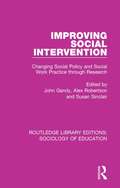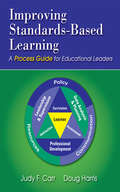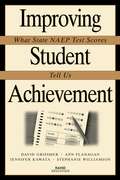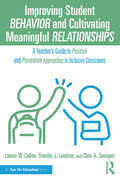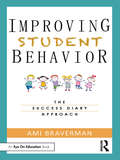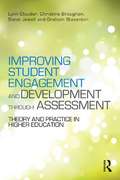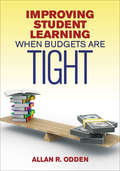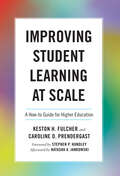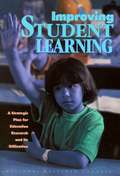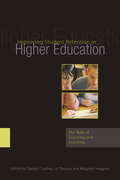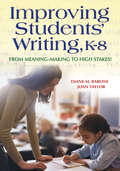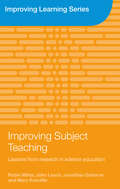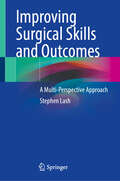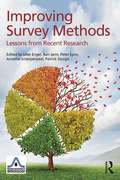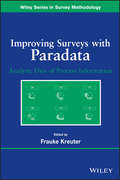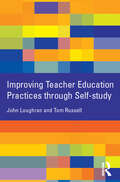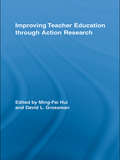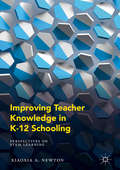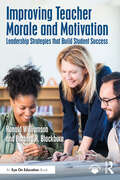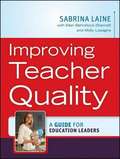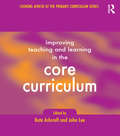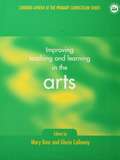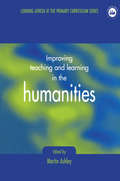- Table View
- List View
Improving Social Intervention: Changing Social Policy and Social Work Practice through Research (Routledge Library Editions: Sociology of Education #27)
by John Gandy Alex Robertson Susan SinclairThis book, first published in 1983, considers the whole problem of how social research can lead to improvement in practice in social policy and social work. In the first section, individual chapters discuss the political context within which research is commissioned and used, through consideration of the politics of comparative research and of the application of research findings to policy-making in the personal social services. The problems of putting policy into practice and using research in a systematic and predictable way for improving situation is also examined. This title will be of interest to students of the Sociology, Education and Social Policy.
Improving Standards-Based Learning: A Process Guide for Educational Leaders
by Judy F. Carr Douglas E. HarrisThis comprehensive resource provides ready-to-use tools to lead educators through the design, implementation, and evaluation of a high-quality, standards-based curriculum that significantly and positively impacts student learning.
Improving Student Achievement: What State NAEP Test Scores Tell Us
by Tom Latourrette Stephanie Williamson Ann Flanagan Jennifer H. Kawata David W. GrissmerWhy do students have different achievement levels across states? Is math achievement improving across states? Differences in average achievement levels across states are mainly traceable to differing family characteristics. However, students from similar families also score differently across states. These differences are related to differences in resource levels and in how resources are spent. States with high spending per pupil, lower pupil-teacher ratios, higher participation in public prekindergarten and higher reported teacher resources have higher achievement. Disadvantaged children are the most sensitive to low resource, and additional resources could substantially their scores. Between-state, rather than within-state, differences in resources appear to be the main reason for inequitable resource levels for students of lower socioeconomic status. The conclusion is that significant math gains are occurring across most states that cannot be traced to resource changes, that the rate of gain varies significantly by state, and that reform efforts are the likely cause of these gains. The results certainly challenge the traditional view of public education as unreformable.
Improving Student Behavior and Cultivating Meaningful Relationships: A Teacher’s Guide to Positive and Preventive Approaches in Inclusive Classrooms
by Timothy J. Landrum Lauren W. Collins Chris A. SweigartThis comprehensive guide offers simple and effective strategies for supporting and improving the classroom behavior of all your students, including those with intensive behavior support needs. Applicable across all K-12 contexts, with recommendations for whole classes as well as individual supports, each practical strategy builds on a foundation of research-supported behavioral approaches. The authors emphasize how each strategy can help build and maintain positive relationships between students and educators, which has been shown to be a key predictor of individual student success. With a myriad of helpful visuals, ready-to-use planning templates, and easy-to-try ideas, this book is key reading for all general or special education teachers, school support staff, and instructional coaches.
Improving Student Behavior: The Success Diary Approach
by Ami BravermanWhat if you could use a handpicked set of tools to help children redirect their classroom behavior from dysfunctional to positive? Improving Student Behavior: The Success Diary Approach is a step-by-step guide to promoting your students’ personal development. This book introduces The Success Diary, a novel, easy-to-use method for involving students in their own behavior modification plans. Designed by an experienced school psychologist, this guide consolidates approaches from various schools of behavioral intervention and integrates them into a streamlined, adaptable framework for teachers looking to engage with children’s unique personalities, skills, motivations, and support systems to create lasting behavioral change. Through these flexible, common-sense guidelines and activities, you can empower your students to participate in working towards better behaviors and healthy social-emotional development.Check out the author's blog at https://materialpsychology.com/blog.
Improving Student Engagement and Development through Assessment: Theory and practice in higher education
by Graham Steventon Lynn Clouder Christine Broughan Steve JewellWith a unique focus on the relationship between assessment and engagement this book explores what works in terms of keeping students on course to succeed. Against a backdrop of massification and the associated increase in student diversity there is an escalating requirement for personalized, technology driven learning in higher education. In addition, the advent of student fees has promoted a consumer culture resulting in students having an increasingly powerful voice in shaping curricula to their own requirements. How does one engage and retain a group of students of such diverse culture, ethnicity, ambition and experience? Using examples from a variety of institutions worldwide this edited collection provides a well-researched evidence base of current thinking and developments in assessment practices in higher education. The chapters discuss: Staff and student views on assessment Engaging students through assessment feedback Assessment for learning Assessing for employability Interdisciplinary and transnational assessment Technology supported assessment for retention The book draws together a wealth of expertise from a range of contributors including academic staff, academic developers, pedagogical researchers, National Teaching Fellows and Centres for Excellence in Higher Education. Recognising that a pedagogy which is embedded and taken-for-granted in one context might be completely novel in another, the authors share best practice and evaluate evidence of assessment strategies to enable academic colleagues to make informed decisions about adopting new and creative approaches to assessment. This interdisciplinary text will prove an invaluable tool for those working and studying in higher education.
Improving Student Learning When Budgets Are Tight
by Dr Allan R. OddenA how-to manual for achieving excellence despite budget cuts This book offers a comprehensive framework to enhance student achievement in good times and in bad. The author provides a school improvement action plan and then shows how to target resources to implement that plan. More than just a “theory” book, this text describes concrete, specific actions that can be taken immediately. Key strategies include: Using data to support boosting student performance Focusing on effective instruction Setting goals to drive resource allocation priorities Setting priorities for situations that require budget cuts Hiring top teachers and providing ongoing professional development Providing needed technology resources
Improving Student Learning at Scale: A How-To Guide for Higher Education
by Keston H. Fulcher Caroline PrendergastThis book is a step-by-step guide for improving student learning in higher education. The authors argue that a fundamental obstacle to improvement is that higher educators, administrators, and assessment professionals do not know how to improve student learning at scale. By this they mean improvement efforts that span an entire program, affecting all affiliated students. The authors found that faculty and administrators particularly struggle to conceptualize and implement multi-section, multi-course improvement efforts. It is unsurprising that ambitious, wide-reaching improvement efforts like these would pose difficulty in their organization and implementation. This is precisely the problem the authors address. The book provides practical strategies for learning improvement, enabling faculty to collaborate, and integrating leadership, social dynamics, curriculum, pedagogy, assessment, and faculty development. In Chapter 2, the authors tell a program-level improvement story from the perspective of a faculty member. Chapter 3 inverts Chapter 2. Beginning from the re-assess stage, the authors work their way back to the individual faculty member first pondering whether she can do something to impact students’ skills. They peel back each layer of the process and imagine how learning improvement efforts might be thwarted at each stage. Chapters 4 through 9 dig deeper into the learning improvement steps introduced in Chapters 2 and 3. Each chapter provides strategies to help higher educators climb each step successfully. Chapter 10 paints a picture of what higher education could look like in 2041 if learning improvement were embraced. And, finally, Chapter 11 describes what you can do to support the movement.
Improving Student Learning: A Strategic Plan for Education Research and Its Utilization
by National Research CouncilThe state of America's schools is a major concern of policymakers, educators, and parents, and new programs and ideas are constantly proposed to improve it. Yet few of these programs and ideas are based on strong research about students and teachers--about learning and teaching. Even when there is solid knowledge, the task of importing it into more than one million classrooms is daunting.Improving Student Learning responds by proposing an ambitious and extraordinary plan: a strategic education research program that would focus on four key questions: How can advances in research on learning be incorporated into educational practice?How can student motivation to achieve in school be increased?How can schools become organizations capable of continuous improvement?How can the use of research knowledge be increased in schools? This book is the springboard for a year-long discussion among educators, researchers, policy makers, and the potential funders-federal, state, and private-of the proposed strategic education research program. The committee offers suggestions for designing, organizing, and managing an effective strategic education research program by building a structure of interrelated networks. The book highlights such issues as how teachers can help students overcome their conceptions about how the world works, the effect of expectations on school performance, and the particular challenges of teaching children from diverse and disadvantaged backgrounds.In the midst of a cacophony of voices about America's schools, this book offers a serious, long-range proposal for meeting the challenges of educating the nation's children.
Improving Student Retention in Higher Education: The Role of Teaching and Learning
by Liz Thomas Glenda Crosling Margaret HeagneyImproving Student Retention in Higher Education provides a practical, curriculum-based response to the current situation in higher education, where participating students emanate from a range of backgrounds; international and lower socioeconomic backgrounds, mature aged students, students with disabilities as well as those for whom higher education is the first family experience. Underpinned by research indicating that students are more likely to continue with higher education if they are engaged in their studies and have developed networks and relationships with their fellow students, this book presents best practice examples of innovative and inclusive curriculum, from a range of countries.
Improving Students' Writing, K-8: From Meaning-Making to High Stakes!
by Diane Barone Joan M. TaylorThis manual for teaching all aspects of writing provides examples, rubrics, and how-to's for helping students grow in skills and write for high stakes and "constructed response" tests.
Improving Subject Teaching: Lessons from Research in Science Education (Improving Learning)
by John Leach Robin Millar Jonathan Osborne Mary RatcliffeIn many countries, questions are being raised about the quality and value of educational research. This book explores the relationship between research and practice in education. It looks at the extent to which current practice could be said to be informed by knowledge or ideas generated by research and at the extent to which the use of current practices or the adoption of new ones are, or could be, supported by research evidence. Science education is used as a case study but the issues considered apply to the teaching and learning of any curriculum subject. The book draws on the findings of four inter-related research studies and considers: how research might be used to establish greater consensus about curriculum; how research can inform the design of assessment tools and teaching interventions; teachers’ and other science educators’ perceptions of the influence of research on their teaching practices and their students’ learning; the extent to which evidence can show that an educational practice ‘works’.
Improving Surgical Skills and Outcomes: A Multi-Perspective Approach
by Stephen LashDrawing on 25 years of experience, Consultant surgeon Mr Stephen Lash offers a fresh approach to the practice of surgery. His three perspectives or ‘Boxes’ explore the ‘How’ the ‘What’ and the ‘Why’ of surgery drawing lessons from Elite athletes to Toyota and from pilots to personality. Each box contributes a novel perspective to the surgeon’s learning and practice and offers practical tips to apply in theatre. It is easy to read and designed to be used alongside training and stimulate interesting conversations during the surgical debrief, best served with coffee. “There are endless books about surgical technique, but a woeful lack of information on how to be a surgeon. This book helps fill that gap.” Prof Andrew Luff MA, MBBS, FRCS, FRCOphth Consultant Ophthalmic Surgeon “I am convinced that it will not only appeal to the surgeons for which it was written but to a wider public as well. After all what is an operating theatre if not an open window on the real world?” Giampaolo Gini MD PhD President of the European Vitreo-Retinal Society This book is an ideal companion to surgeons everywhere from Dentists on the high street to Consultants in specialist units, medical students to key opinion leaders and anyone interested in this particular type of person willing to cut into another in pursuit of wholeness.
Improving Survey Methods: Lessons from Recent Research (European Association of Methodology Series)
by Uwe Engel Ben Jann Peter Lynn Annette Scherpenzeel Patrick SturgisThis state-of-the-art volume provides insight into the recent developments in survey research. It covers topics like: survey modes and response effects, bio indicators and paradata, interviewer and survey error, mixed-mode panels, sensitive questions, conducting web surveys and access panels, coping with non-response, and handling missing data. The authors are leading scientists in the field, and discuss the latest methods and challenges with respect to these topics. Each of the book’s eight parts starts with a brief chapter that provides an historical context along with an overview of today’s most critical survey methods. Chapters in the sections focus on research applications in practice and discuss results from field studies. As such, the book will help researchers design surveys according to today’s best practices. The book’s website www.survey-methodology.de provides additional information, statistical analyses, tables and figures. An indispensable reference for practicing researchers and methodologists or any professional who uses surveys in their work, this book also serves as a supplement for graduate or upper level-undergraduate courses on survey methods taught in psychology, sociology, education, economics, and business. Although the book focuses on European findings, all of the research is discussed with reference to the entire survey-methodology area, including the US. As such, the insights in this book will apply to surveys conducted around the world.
Improving Surveys with Paradata
by Frauke KreuterExplore the practices and cutting-edge research on the new and exciting topic of paradataParadata are measurements related to the process of collecting survey data.Improving Surveys with Paradata: Analytic Uses of Process Information is the most accessible and comprehensive contribution to this up-and-coming area in survey methodology.Featuring contributions from leading experts in the field, Improving Surveys with Paradata: Analytic Uses of Process Information introduces and reviews issues involved in the collection and analysis of paradata. The book presents readers with an overview of the indispensable techniques and new, innovative research on improving survey quality and total survey error. Along with several case studies, topics include:Using paradata to monitor fieldwork activity in face-to-face, telephone, and web surveysGuiding intervention decisions during data collectionAnalysis of measurement, nonresponse, and coverage error via paradataProviding a practical, encompassing guide to the subject of paradata, the book is aimed at both producers and users of survey data. Improving Surveys with Paradata: Analytic Uses of Process The book also serves as an excellent resource for courses on data collection, survey methodology, and nonresponse and measurement error.
Improving Teacher Education Practice Through Self-study
by Tom Russell John LoughranSelf-study in teacher education is a growing field and a natural progression from the concept of reflective practice for pre-service teachers. This book is designed to introduce teacher educators to the theory and practice of self-study, in order to explore, understand and improve their teaching about teaching.With studies from an international range of contributors, this book illustrates a variety of approaches to self-study. It describes the issues that teacher educators have chosen to study, how they carried out their research and what the learning outcomes were. Throughout, the emphasis is on placing teacher educators' knowledge and practice at the centre of their academic work.This book will be of interest to all teacher educators wishing to improve their knowledge and practice.
Improving Teacher Education through Action Research (Routledge Research in Education)
by Ming-Fai Hui David L. GrossmanThere has been a dearth of studies on teacher educators using action research to improve their own practice. This book is the first systematic study of a group of teachers examining and enhancing their own practice through the inquiry process of action research. This book presents a broad overview of a variety of methodologies that can be used to improve teacher preparation and professional development programs. It is a ‘must read’ book for those educators who are new to the college teaching profession and for those who are aspired to be outstanding and successful lecturers.
Improving Teacher Knowledge in K-12 Schooling: Perspectives On Stem Learning
by Xiaoxia A. NewtonThis volume examines how several key components of the mathematics education system in the United States fail to provide teachers with adequate and effective tools to teach mathematics in K-12 classrooms. These components consist of teachers’ own learning experiences as students in K-12 classrooms, their undergraduate or graduate trainings in mathematics, and their in-service professional development trainings. Newton argues that unless we improve these system components as a whole and recognize the importance of teaching future mathematics teachers explicitly and rigorously the topics they are expected to teach, teachers will continue to recycle a body of incoherent and incomprehensible mathematical knowledge to their students, because these are the only types of mathematical knowledge they have at their disposal, both in terms of what they themselves have learned as K-12 students and in terms of the mathematical resources available to them, including the textbooks they rely on to teach as mathematics teachers.
Improving Teacher Morale and Motivation: Leadership Strategies that Build Student Success
by Ronald Williamson Barbara R. BlackburnImproving Teacher Morale and Motivation discusses a key issue for school leaders: motivating teachers to improve learning for students. Immense and unprecedented changes in education—primarily with the pandemic and "great resignation"—have affected all areas of teaching and learning, including teacher morale and motivation. This engaging book takes an in-depth focus on student learning as it relates to teacher motivation, providing specific examples of how to motivate teachers during challenging times. Specific tools, templates, and strategies are incorporated throughout the book to help leaders understand and act on issues of intrinsic and extrinsic motivation, collaboration and trust, growth mindset, effective feedback, and more. Further, this text incorporates a broader look at how school leaders can shape their school and make it a place where teachers want to work, where they are committed to the success of students, and where they see themselves remaining well into the future. This timely book is appropriate for all school leaders, including teacher-leaders and district leaders.
Improving Teacher Morale and Motivation: Leadership Strategies that Build Student Success
by Ronald Williamson Barbara R. BlackburnImproving Teacher Morale and Motivation discusses a key issue for school leaders: motivating teachers to improve learning for students. Immense and unprecedented changes in education—primarily with the pandemic and "great resignation"—have affected all areas of teaching and learning, including teacher morale and motivation. This engaging book takes an in-depth focus on student learning as it relates to teacher motivation, providing specific examples of how to motivate teachers during challenging times. Specific tools, templates, and strategies are incorporated throughout the book to help leaders understand and act on issues of intrinsic and extrinsic motivation, collaboration and trust, growth mindset, effective feedback, and more. Further, this text incorporates a broader look at how school leaders can shape their school and make it a place where teachers want to work, where they are committed to the success of students, and where they see themselves remaining well into the future. This timely book is appropriate for all school leaders, including teacher-leaders and district leaders.
Improving Teacher Quality
by Ellen Behrstock-Sherratt Molly Lasagna Sabrina W. LaineTechniques for the difficult task of improving teacher qualityNo one stakeholder group can realize lasting change on their own; nor can any reform initiative focusing on just one type of strategy create the workplace conditions needed to truly build capacity within the education profession. Rather, stakeholders must focus on collaborating, reaching common understanding, and prioritizing for ultimate impact on the quality of teachers and teaching. This book discusses research and concrete examples of practice tied to teacher quality intended to improve eight key interrelated factors: Preparation; Recruitment; Hiring; Induction; Professional Development; Compensation and Incentives; Working Conditions; and Performance Management. Offers a framework and strategies for understanding the issues that make up the teacher quality question Written for educational leaders, superintendents, district administrators, teacher leaders, and principals, as well as policy-makers and other stakeholdersFilled with illustrative examples teacher qualityThe author addresses the most important factor that affects student achievement-the quality of the teacher.
Improving Teaching Effectiveness: The Intensive Partnerships for Effective Teaching Through 2013–2014
by Brian M. Stecher Laura S. Hamilton Abby Robyn Elizabeth D. Steiner Deborah Holtzman Eleanor S. Fulbeck Iliana Brodziak de los Reyes Jay Chambers Jeffrey Poirier Michael S. GaretTo improve the U.S. education system through more-effective classroom teaching, in school year 2009–2010, the Bill and Melinda Gates Foundation announced its Intensive Partnerships for Effective Teaching. Researchers from the RAND Corporation and the American Institutes for Research evaluated implementation of key reform elements of the program in three public school districts and four charter management organizations.
Improving Teaching and Learning In the Core Curriculum
by John Lee Kate Ashcroft Professor Kate AshcroftFocusing on the core subjects of Mathematics, English and Science, the book addresses the political agenda in which the core curriculum takes place, and provides practical information and guidance on teaching the three subjects. The book briefly traces the history of these core subjects, examines what is meant by 'curriculum knowledge', takes apart the classroom and educational issues before offering advice on handling curriculum change and tackling new approaches to teaching. It helps teachers develop their skills through enquiry tasks, case studies, questions and suggested further reading.
Improving Teaching and Learning in the Arts
by Gloria Callaway Mary KearCovers the contribution of arts to children's learning from Art and Design, Design for Technology to Drama and Music. The book also looks at the state of the arts in primary schools, and includes an evaluation of the relationships between the arts and those moral, spiritual, cultural and social values which impinge on all aspects of the arts and arts education. Each subject within the arts curriculum is considered separately to illustrate the general and specific issues which influence the work of the class teacher. The book also takes on the current thorny issue of assessment, recording and reporting, offering strategies for ways of responding to children's work, and suggestions for accumulating evidence on which to base assessment.
Improving Teaching and Learning in the Humanities
by Martin AshleyFocuses on religious education, history, geography and cross-curricular planning in the primary school. It includes discussion of the purpose of education, and how the humanities fit with this purpose, with particular reference to the 1998 Education Act and 1994 National Curriculum Review. The book deals with the themes of time, place, values, communication, responsibilities and decision-making. These link the chapters, and are fully complemented with case studies. For each concept there are suggestions for practical classroom activities. The reader will find the book invaluable in integrating the subjects across the National Curriculum.
